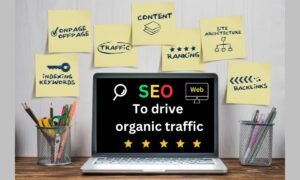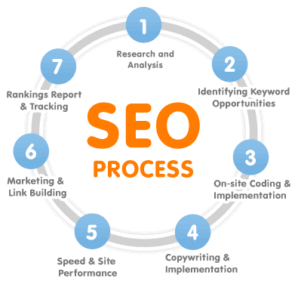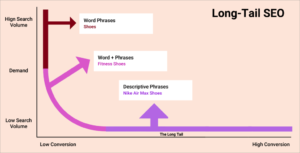How to Boost Organic Traffic to Your Website: Time-Tested Strategies for Success

Organic traffic is of importance for website growth nowadays in this digital age. While paid traffic comes from ads, organic traffic comes from search engines and makes much better sense as a long-term campaign to increase the number of your audience. For those who want to learn how not to fall into the costly trap of advertising, this guide will give you strategies on increasing website traffic without spending too much on advertisements.
Why Organic Traffic Matters
Organic traffic is important because it will bring you visitors who are interested in your content, products, or services. These users are actively looking for solutions, thus potentially engaging with your website. Also, because Google and other search engines are focusing much on user experience, websites that enjoy traffic from organic sources gain better rankings.
Finally, let’s discuss the best strategies to achieve organic website traffic.
SEO Optimization for Your Website

SEO is the backbone of any organic traffic. SEO, in the right sense, is good to implement because it increases website traffic through your improvement in SERPs.
Some of the main techniques for SEO:
- Keyword Research: For starters, look for relevant keywords searched by users. The tools to find keywords with high volume and low competition are Google Keyword Planner, SEMrush, and Ubersuggest. In your content, headings, and meta descriptions, you make use of them.
- On-Page Optimization: Make sure you are optimizing your on-page elements. It starts from the title tags, then your meta description and headings. You make sure that your key word “increases website traffic” is used organically in your content.
- Mobile Optimization: Ensure that your website is mobile-friendly, as mobile search traffic accounts for a huge share of all organic traffic.
Use Internal Linking To help visitors navigate your site and discover more of your content. Internal linking helps crawlers crawl your site more effectively, which means better overall rankings.
Publish High-Quality Content Regularly

Organic traffic relies on the quality of content produced on the site. Web pages that keep posting valuable, well-researched, and engaging contents achieve higher ranks on the search engines. Well thought out content will increase traffic to the website by engaging visitors and bringing them back on the page.2
Best Practices in Content Creation:
- Focus on Relevance: Your content should answer all the questions for your users and provide them with value. Your content includes blog posts, guides, and case studies that answer problems for your targeted audience.
- Content Length: Most long-form content gets more optimal rankings in search because it can cover a topic in finer detail. This format provides the user with answers to their relevant search queries.
- Evergreen content: Once it is created, the world can enjoy it forever. Evergreen post will continue to drive organic traffic long after it is published. Trend-based content does all work when hot .
- Use Visuals: Adding images, infographics, and videos makes users’ experience better. They break up that long block of text, but your content gets shared more often and helps drive more organic traffic.
Improve UX of Your Website

The richer the experience is for the visitor when at your website, the more likely you are going to increase traffic to your website. Better UX keeps visitors on your site longer and with more chances of accessing more pages, and this is a good message sent from search engines about the value of the site.
Improve UX by:
- Loads Fast: They expect that your website should load in the least time possible. If it takes more than a couple of seconds to load, users tend to look elsewhere. Google PageSpeed Insights and tools like that will help discover which issues you have and fix them.
- Clean Navigation: Keep your visitors finding exactly what they are searching for with ease. A clear navigation system across the website keeps customers engaged and enhances the effectiveness of SEO.
- Responsive Design: Your website must look good as well as run perfectly on desktop, tablet, and mobile phones.
- CTAs (Calls-to-Action): Use bold, persuasive calls to action when you want users to take a specific action, such as signing up for your newsletter or checking out more content.
Use Social Media Channels

Social media itself is not a direct ranking factor in SEO, but it definitely does play a very important role in the boosting organic traffic. Any use of social media in the promotion of your content will have more visitors on your site and increase website traffic organically.
Social Media Tips:
- Share Valuable Content: You should share your blog posts, infographics, and videos on social channels to create traffic for your website. At the same time, note the environment in addition to to whom you are providing the content.
- Engage Your Audience: It is a pretty essential step in building trust with the followers by replying to comments and messages. Engagement helps people revisit the site and allows them to do so comfortably.
- Use of Hashtags: Ensure to use relevant hashtags that get your posts more visibility. Therefore, it helps you to reach a larger audience that enhances organic traffic.
- Collaboration with Influencers: Engagement with influencers or industry specialists will give content wider reach, therefore gaining more organic traffic.
Quality Backlinks

Back links are amongst the ranking influencers generating humongous traffic towards a website. A backlink happens when some other website links to your site and with the help of the high quality back links your site gains more authority in the eyes of search engines .
Techniques for Back link building
- Guest Blogging: Write articles for other quality sites in your niche, then place the link to your website at the bottom of your article so people will actually check it out.
- Content Outreach: Find bloggers or journalists who would want to quote you in their article. They often link back to your site if they found the material valuable.
- Broken link building: There has to be some broken link somewhere on others’ site and then put their link in place with an alternative that is your content.
- Create linkable assets: You are going to publish high-value content, such as infographics, case studies, or in-depth guides, which others will be able to link to.
Long Tail Optimization

Long tail keywords are usually more specific and, hence, less competitive than short, broad words. Using long-tail keywords allows you to target niche audiences and brings much more website traffic with far greater efficiency.
Why Long-Tail Keywords Work:
- Lower Competition: Generally, long-tail keywords contain much less competition, which means it is easier to rank higher on the SERPs.
- Higher Conversion Rates: Generally, longer-tail keywords have more relevant searches because users are very clear about their needs. Chances of conversion are more, as compared to regular keywords.
If you search for “how to increase website traffic organically without paid ads,” it’s more helpful than trying for “increase website traffic.”.
Revive the Old Content

The more you update your old content, the more relevant it is likely to be to search engines and traffic coming to your website. Updated posts to make your blog fresh with a lift in rankings from search engines favor those websites that go on to update their content regularly. .
Update Your Content:
- Insert New Info: Update the content with fresh stats, trends, or tips.
- Right old links: Also check if you have some broken links and replace them with relevant working ones.
- New keywords: In case the keyword trends have changed, update the relevant content so that the version to be published is targeted towards more relevant search terms.
Utilize Google Analytics and Search Console

To continuously improve your organic traffic you’ll want to monitor what’s working and what isn’t. This is helpful in knowing how users find and use your site through insights from Google Analytics and Search Console.
Use These Tools to
- Track Organic Traffic: Know how much of your traffic comes from search engines and which keywords are driving it.
- Identify Pages That Already Are High Performers: Leverage the list of content pieces that have already worked for you and optimize more of those similar pages to drive in more traffic.
- Fix SEO Errors with Search Console: Find and fix issues like broken links, crawl errors, slow page speed.
Conclusion
Increasing your traffic organically will take everything from fine-tuning your site for SEO and improving its experience for visitors to continually publishing high-quality content. Focusing on these key areas will not only help you increase website traffic but also ensure that you attract the right kind of visitor-one who’s actually interested in what you have to offer. Apply these tactics today and grow your organic traffic!
Hi, this is a comment.
To get started with moderating, editing, and deleting comments, please visit the Comments screen in the dashboard.
Commenter avatars come from Gravatar.